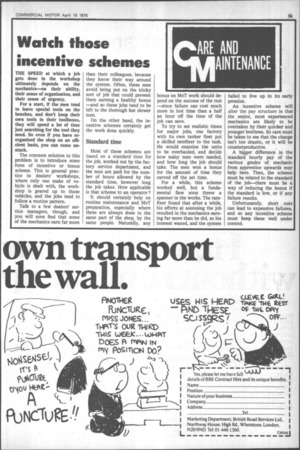Watch those incentive schemes
Page 55

If you've noticed an error in this article please click here to report it so we can fix it.
THE SPEED at which a job gets done in the workshop ultimately depends on the mechanics—on their ability, their sense of organisation, and their sense of urgency.
For a start, if the men tend to leave special tools on the benches, and don't keep their own tools in their toolboxes, they will spend a lot of time just searching for the tool they need. So even if you have reorganised the shop on an efficient basis, you can come unstuck.
The common solution to this problem is to introduce some form of incentive or bonus scheme. This is general practice in dealers' workshops, where only one make of vehicle is dealt with, the workshop is geared up to those vehicles, and the jobs tend to follow a routine pattern.
Talk to a few dealers' service managers, though, and you will soon find that some of the mechanics earn far more than their colleagues, because they know their way around the system. Often, these men avoid being put on the tricky sort of job that could prevent them earning a healthy bonus —and so these jobs tend to be left to the thorough but slower men.
On the other hand, the incentive schemes certainly get the work done quickly.
Standard time
Most of these schemes are based on a standard time for the job, worked out by the factory service department, and the men are paid for the number of hours allowed by the standard time, however long the job takes. How applicable is that scheme to an operator ?
It should certainly help on routine maintenance and MoT preparation, especially where these are always done in the same part of the shop, by the same people. Naturally, any bonus on MoT work should depend on the success of the test —since failure can cost much more in lost time than a half an hour off the time of the job can save.
To try to set realistic times for major jobs, one factory with its own tanker fleet put a skilled ratefixer to the task. He would examine the units to be overhauled, and decide how many men were needed, and how long the job should take. The men won a bonus for the amount of time they carved off the set time.
For a while, this scheme worked well, but a fundamental flaw soon threw a spanner in the works. The ratefixer found that after a while, his efforts at assessing the job resulted in the mechanics earning far more than he did, so his interest waned, and the system failed to live up to its early promise.
An incentive scheme will alter the pay structure in that the senior, most experienced mechanics are likely to be overtaken by their quicker and younger brethren. So care must be taken to see that the change isn't too drastic, or it will be counterproductive.
A bigger difference in the standard hourly pay of the various grades of mechanic from apprentice upwards may help here. Then, the scheme must be related to the standard of the job—there must be a way of reducing the bonus if the standard is low, or if any failure results.
Unfortunately, short cuts can lead to expensive failures, and so any incentive scheme must keep these well under control.




























































































